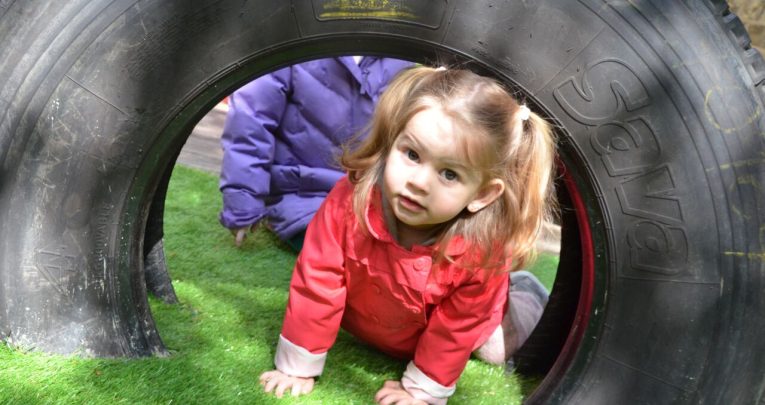Do You Have the Confidence to Offer Challenging Play Outdoors?

Children’s development is being affected by the lack of understanding around safe risk taking in the early years, explains Fay Gibbin…
- by Fay Gibbin

The benefits of physical activity on children’s health are well documented – yet while speaking at Action for Children’s Munch ’n’ Move event in late February Ofsted’s deputy director of early education, Gill Jones, claimed that nurseries and preschools are not physically challenging enough for young children.
One of the difficulties early years practitioners often face is how to provide children with opportunities to take part in challenging activities while keeping robust safety measures in place. But are setting playing it too safe, and are children missing out on vital learning opportunities as a result?
Balancing act
Striking the right balance between allowing a child the freedom to explore and keeping them from harm is tricky. Children have a natural desire to investigate: they love to climb and feel objects with their mouths and are drawn to interesting textures, funny sounds and bright lights.
This is because these experiences help them to learn and develop an understanding of the world around them. Such play can sometimes lead to trips and tumbles – but while the safety of children must remain paramount, we must also be careful not to let an overprotective approach limit their opportunities to grow and develop.
The Early Years Foundation Stage (EYFS) framework urges early years practitioners to support children to take ‘safe risks’ and encourage them to try new activities and judge risks for themselves.
It also states that they should, “Always respect children’s efforts and ideas, so they feel safe to take a risk with a new idea.”
Despite this, practitioners often err on the side of caution and, with the best of intentions, may encourage children to follow safer, more structured activities, leaving less opportunity for children to encounter healthy risks during playtime.
Practitioners may feel more confident allowing a preschooler to explore their surroundings and test their limits than a younger child; however, as soon as children are able to reach out and explore we should be supporting them by offering a range of challenging physical development opportunities.
Inspiring activities
The outdoors is the ideal location for challenging physical play – it offers many great experiences for young children and, as long as equipment is age-appropriate and practitioners are supervising at all times, they should be encouraged to explore it at every opportunity.
The changing colours, smells, textures, wildlife and plants all make it a stimulating alternative to the indoor classroom, adding to its appeal.
But being able to make the most of the outdoors is a skill that needs to be acquired. High-quality training opportunities for childcare professionals are available and can equip staff with the knowledge they need to support challenging play in their settings.
Early years learning and development courses that cover physical development and exploring outdoor learning opportunities focus on allowing children to make independent choices and exercise their imaginations, as well as their physical limits, in line with the EYFS.
Effective training in this area should open practitioners’ minds to the importance of offering challenging play as an effective resource for child development and support them in developing their learning environment to provide holistic learning opportunities to children, while also covering how to carry out a risk assessment to ensure all activities are as safe as possible.
With the right training, early years settings can create an environment that nurtures children’s growth, independence and voice as well as their physical abilities – all vital elements of promoting lifelong happiness and wellbeing.
 Fay Gibbin is CEO of BB Training Academy (formerly Busy Bees Training), which currently oversees over 2,300 early years, residential care, management and catering apprenticeships as well as offering 26 learning and development courses delivered across the country. It is among the 2% of training providers across all sectors rated ‘outstanding’ by Ofsted.
Fay Gibbin is CEO of BB Training Academy (formerly Busy Bees Training), which currently oversees over 2,300 early years, residential care, management and catering apprenticeships as well as offering 26 learning and development courses delivered across the country. It is among the 2% of training providers across all sectors rated ‘outstanding’ by Ofsted.











